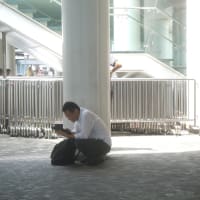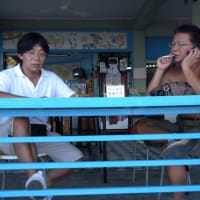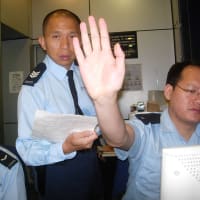Your Sars questions answered
(South China Morning Post 2003.04.03 Pneumonia Outbreak)
Doctor Margaret Cheng is on hand to answer your queries on the atypical pneumonia outbreak. If you have any questions, e-mail them to talkback@scmp.com
Q How many people usually die of pneumonia in Hong Kong each year? Is the figure for atypical pneumonia such a huge increase on this?
A Many more people die of all forms of pneumonia in Hong Kong every year than have so far died of Sars. According to Professor Anthony Hedley of the University of Hong Kong's Department of Community Medicine there are 22,000 cases of pneumonia and 3,000 deaths from all causes of pneumonia each year.
So, you might well ask, what is all the fuss about? The reason this thing is causing such concern in medical circles is that it is an entirely new virus, and one we don't know enough about to predict whether it will get worse, cause more harm and spread more rapidly. Secondly, it is infecting relatively young healthy adults whereas most forms of pneumonia affect the very young (small babies) and the very old.
Q How long is it envisaged this situation will last? When is it likely our children will be able to return to school and our friends who have left be able to return?
A This is a question only an exceptionally talented fortune-teller can answer accurately. The reason the schools were closed for 10 days is that the virus appears to take up to 10 days to incubate. The idea is that if you keep the kids away from each other, you stop the thing spreading so easily. If you manage to isolate all new cases, you should be able to get the virus to burn itself out. In Vietnam it appears good work by the authorities and a quick response from the World Health Organisation have contained the spread there. They have had no new cases for several days. And in Singapore, the worst appears to be over as well. However, it is not a very co-operative virus. It appears to have changed its pattern of spread in Amoy Gardens - the factor that has made the authorities step up control measures here. While we are still guessing, the best place for our children is in clean homes where all utensils are kept meticulously clean and hands washed before and after to!
uching any part of the face. It's boring but it's also a good chance for them to get more sleep than usual and to take their time doing all that homework the teachers love to pile on.
Q As the experts are now not ruling out that this virus is airborne, what precautions can we take, if any?
A The experts are still not convinced this has become an airborne infection. The reason they cleared out Amoy Gardens is that they wanted to thoroughly investigate all possible patterns of spread there, hoping to rule out the possibility it may have become airborne. And of course they could not leave residents in there at risk of getting infected if there was something in the environment infecting people.
If it does develop airborne spread it will be difficult to control. Wearing masks may stop some virus particles but the filtration is never perfect. The best defence would be to speed up vaccine production and to embark on large-scale immunisation. There are already a number of coronavirus vaccines used in various forms for animals so the vaccine-producing companies have the expertise to achieve a vaccine relatively quickly. They have already been given virus samples to work with. But remember, coronaviruses have not shown airborne spread in humans before and the experts are not convinced it is happening now. Developing a vaccine is simply a very wise precaution.
Q I live about 100 metres from one of the suggested quarantine centres. Should I be worried?
A No. The reason people have been sent there is to give them an environment that the medical authorities are confident is very clean and virus-free. And at the same time the people quarantined will be monitored very carefully so those with any sign of illness will be isolated immediately. With the level of care being taken and the thorough cleansing involved you are probably 100 metres from one of the healthiest and safest environments in Hong Kong right now.
Q Of those who have survived the virus, how is their health now?
A Those who have survived - and these, by the way, are the vast majority of those infected - seem to have achieved normal health within two to three weeks.
Some people were only sick for a few days, suffering little more than a high fever, sore throat, a bit of a cough, something you or I would call a touch of the flu. Again, as I said earlier, the reason doctors are taking this thing so seriously is because it is a new virus that we are finding out about as we go along. They are taking the better-safe-than-sorry approach with all these precautions and quarantines in order to prevent it turning into anything worse. While it seems frightening, what it really indicates is what an outstanding and hard-working health service we have. Instead of all the criticism I think it would do us all a lot more good to say thank you to the people working around the clock to protect our health.
Q I feel so uncomfortable with my bronchial tubes and have been short of breath for almost a week. I have already seen a doctor but the medicine couldn't cure my problem. This problem arose just the day after I wore a surgical mask. So is it possible that I am allergic to the fabrics of the masks?
A It's quite possible the mask is causing an acute anxiety reaction, which can cause a feeling of breathlessness and tightness in the chest in susceptible people.
The tiny fibres coming off the mask surface may be irritating your airways a little, too. My advice is: forget the mask. The experts at both the World Health Organisation and the Centers For Disease Control and Prevention in the US do not think the masks are protecting healthy people. The only time they consider a mask useful is when it is worn by someone who is coughing or sneezing to prevent them sneezing on others.
Hand-washing, though, is very useful, they all agree. They want to see people wash their hands all the time, before eating, after using the bathroom, after being out and about, touching lift buttons, door handles, all surfaces touched by other people. Because it is often hard to find a bathroom or sink to wash at, carry a box of alcohol wipes at all times. They are much less irritating than that mask.
(South China Morning Post 2003.04.03 Pneumonia Outbreak)
Doctor Margaret Cheng is on hand to answer your queries on the atypical pneumonia outbreak. If you have any questions, e-mail them to talkback@scmp.com
Q How many people usually die of pneumonia in Hong Kong each year? Is the figure for atypical pneumonia such a huge increase on this?
A Many more people die of all forms of pneumonia in Hong Kong every year than have so far died of Sars. According to Professor Anthony Hedley of the University of Hong Kong's Department of Community Medicine there are 22,000 cases of pneumonia and 3,000 deaths from all causes of pneumonia each year.
So, you might well ask, what is all the fuss about? The reason this thing is causing such concern in medical circles is that it is an entirely new virus, and one we don't know enough about to predict whether it will get worse, cause more harm and spread more rapidly. Secondly, it is infecting relatively young healthy adults whereas most forms of pneumonia affect the very young (small babies) and the very old.
Q How long is it envisaged this situation will last? When is it likely our children will be able to return to school and our friends who have left be able to return?
A This is a question only an exceptionally talented fortune-teller can answer accurately. The reason the schools were closed for 10 days is that the virus appears to take up to 10 days to incubate. The idea is that if you keep the kids away from each other, you stop the thing spreading so easily. If you manage to isolate all new cases, you should be able to get the virus to burn itself out. In Vietnam it appears good work by the authorities and a quick response from the World Health Organisation have contained the spread there. They have had no new cases for several days. And in Singapore, the worst appears to be over as well. However, it is not a very co-operative virus. It appears to have changed its pattern of spread in Amoy Gardens - the factor that has made the authorities step up control measures here. While we are still guessing, the best place for our children is in clean homes where all utensils are kept meticulously clean and hands washed before and after to!
uching any part of the face. It's boring but it's also a good chance for them to get more sleep than usual and to take their time doing all that homework the teachers love to pile on.
Q As the experts are now not ruling out that this virus is airborne, what precautions can we take, if any?
A The experts are still not convinced this has become an airborne infection. The reason they cleared out Amoy Gardens is that they wanted to thoroughly investigate all possible patterns of spread there, hoping to rule out the possibility it may have become airborne. And of course they could not leave residents in there at risk of getting infected if there was something in the environment infecting people.
If it does develop airborne spread it will be difficult to control. Wearing masks may stop some virus particles but the filtration is never perfect. The best defence would be to speed up vaccine production and to embark on large-scale immunisation. There are already a number of coronavirus vaccines used in various forms for animals so the vaccine-producing companies have the expertise to achieve a vaccine relatively quickly. They have already been given virus samples to work with. But remember, coronaviruses have not shown airborne spread in humans before and the experts are not convinced it is happening now. Developing a vaccine is simply a very wise precaution.
Q I live about 100 metres from one of the suggested quarantine centres. Should I be worried?
A No. The reason people have been sent there is to give them an environment that the medical authorities are confident is very clean and virus-free. And at the same time the people quarantined will be monitored very carefully so those with any sign of illness will be isolated immediately. With the level of care being taken and the thorough cleansing involved you are probably 100 metres from one of the healthiest and safest environments in Hong Kong right now.
Q Of those who have survived the virus, how is their health now?
A Those who have survived - and these, by the way, are the vast majority of those infected - seem to have achieved normal health within two to three weeks.
Some people were only sick for a few days, suffering little more than a high fever, sore throat, a bit of a cough, something you or I would call a touch of the flu. Again, as I said earlier, the reason doctors are taking this thing so seriously is because it is a new virus that we are finding out about as we go along. They are taking the better-safe-than-sorry approach with all these precautions and quarantines in order to prevent it turning into anything worse. While it seems frightening, what it really indicates is what an outstanding and hard-working health service we have. Instead of all the criticism I think it would do us all a lot more good to say thank you to the people working around the clock to protect our health.
Q I feel so uncomfortable with my bronchial tubes and have been short of breath for almost a week. I have already seen a doctor but the medicine couldn't cure my problem. This problem arose just the day after I wore a surgical mask. So is it possible that I am allergic to the fabrics of the masks?
A It's quite possible the mask is causing an acute anxiety reaction, which can cause a feeling of breathlessness and tightness in the chest in susceptible people.
The tiny fibres coming off the mask surface may be irritating your airways a little, too. My advice is: forget the mask. The experts at both the World Health Organisation and the Centers For Disease Control and Prevention in the US do not think the masks are protecting healthy people. The only time they consider a mask useful is when it is worn by someone who is coughing or sneezing to prevent them sneezing on others.
Hand-washing, though, is very useful, they all agree. They want to see people wash their hands all the time, before eating, after using the bathroom, after being out and about, touching lift buttons, door handles, all surfaces touched by other people. Because it is often hard to find a bathroom or sink to wash at, carry a box of alcohol wipes at all times. They are much less irritating than that mask.




















Your Sars questions answered
(South China Morning Post 2003.04.04 Pneumonia Outbreak)
DOCTOR MARGARET CHENG
Doctor Margaret Cheng is on hand to answer your queries on the atypical pneumonia outbreak. If you have any questions for her, please e-mail them to mharris@netvigator.com
Question: Can face masks made of gauze be reused after washing?
Answer: Yes. Wash your face mask separately from other items in hot water with some bleach. But remember, your face mask is only really useful as a means of preventing you from infecting others. The most effective thing you can do to protect yourself is to wash your hands as often as possible or wipe them with alcohol wipes. And remember that when your mask is wet it will not filter effectively.
Question: Sars is defined by a high fever before the onset of other symptoms. On average, how long does this period of fever last, and if for several days or more, how dangerous is this to babies and very young children?
Answer: I wouldn't say Sars is defined by a high fever before the onset of other symptoms. But a high fever (over 38 degrees Celsius) is indeed the usual first symptom. Some people also get aches and pains at the same time, others a dry cough, some get a sore throat, while a few have reported diarrhoea.
But you are right to be concerned about a high fever in small children and babies because this is a symptom that can cause convulsions in them. If your child has a fever for any reason you need to work to get it down to normal (37 degrees) by sponging the child with tepid water and giving the correct dose (for his weight and age) of paracetemol. Remember a child with fever must never be given aspirin. Any child with a fever should also see a doctor immediately. It is best to see your private doctor because the hospitals are overloaded with cases. I am told some parents are not taking sick children to see their doctors for fear of contracting Sars, but leaving a child untreated and undiagnosed is much more risky than sitting in a doctor's waiting room.
Question: Can I spread the virus through my clothing - say for example, hugging my kids after being in the office all day?
Answer: It's theoretically possible that if someone sneezed all over you shortly before you came home and your child put his face to the very spot the person sneezed on, the virus could be transmitted. But we are not talking about something very likely. I would put it in the million-to-one bad luck category. However, if you are fearful - and once you become a parent this is a natural state of mind - remove your outer clothing and put it in the wash before you hug or kiss or play with your kids. But don't let paranoia ruin your family life!
Question: I run a small office of 10 people. What should I be doing to protect us all?
Answer: Firstly, calm everyone down. The hysteria levels are probably more damaging than anything else. Secondly, review the cleanliness of your entire work space and ask your usual office cleaners to do a special clean-up with diluted bleach. Discuss infection control, especially the need to wash hands before and after eating, after using the bathroom and before using office equipment, especially shared office equipment. Make sure there is adequate soap and toilet paper in the bathroom. If it is shared, insist building management provides some or provide it yourself as a service (and example) to all. Also provide adequate disposable hand-wipes in your office and encourage your staff to use them.
If staff feel more secure wearing masks, let them, but don't force them to because there is no proof this is protecting healthy people. Anyone who is coughing or sneezing should not come into work, and if they begin coughing or sneezing while at work they should be asked to go home and to see a doctor to make certain they are not developing Sars.
If anyone in your office does develop Sars, all staff need to be screened and the office closed and disinfected. If your business is one that may be run from home, develop a contingency plan that allows you to do this should the infection hit your office.
Question: Does the weather contribute to the spread of the virus? Do humidity and rain make it worse?
Answer: Again, until a lot of testing going on now has been analysed we won't know for sure how the weather affects the virus. It appears to be a cold-weather virus, because that is when it turned up, but this sort of question can't be answered accurately without more testing.
Your Sars questions answered
(South China Morning Post 2003.04.05 Pneumonia Outbreak)
DOCTOR MARGARET CHENG
Doctor Margaret Cheng is on hand to answer your queries on the atypical pneumonia outbreak. If you have any questions for her, e-mail them to mharris@netvigator.com.
Q Many of my friends have left or are planning to leave Hong Kong to avoid the risk of Sars. I'm considering doing the same but I'm concerned about the possibility of transmission on a long-haul flight, not to mention potential waits and screening at airports, and the worries of keeping surgical masks on two young children. Which is more sensible: living with the fear of the unknown here or leaving, but worrying about flying for 13 hours with two young children?
A The places we know people have caught Sars have been in the Metropole Hotel, in Amoy Gardens, in hospitals treating Sars patients and in aeroplanes. If you are not staying in a high-density housing block, are not visiting hospitals or hotels and are avoiding lifts and crowded places, you and your children are much safer here than on a plane. Those who caught it tended to be sitting in the rows just in front of infected people, but there were some exceptions. I know a lot of people have fled or are fleeing, but this is a bit of a knee-jerk reaction prompted by fear and the desire to be in the place you always feel safest - home. It seems local people donned masks to quell their fears while expats booked plane tickets! If you really are so frightened you would prefer to take these risks, I suggest breaking up the flight or taking a night flight that may allow your children to sleep during the entire journey. Take a box of hand wipes and just wash their hands and faces!
all the time. And take a lot of diversions: books, pencils, paper, small toys, games, foods, drinks, things you know will keep them happy for a while, because you are going to need them in those queues.
Q I have to make a decision in the next two weeks about whether to visit Shanghai in October. If Sars can be contained in the next two months or so, will it still be safe to travel?
A Shanghai has only just experienced its first cases of Sars, which appear to have been imported from elsewhere in China. Some cities where this has happened have managed to quickly contain the virus. It depends on how infectious the first case proves and how quickly it is identified and treated. Over the next two weeks you should probably see a clear pattern emerging in Shanghai which will give you a better idea of what the future holds. I'm no fortune teller but I'd expect the problem to be dealt with effectively by October.
Q Has Sars arrived in Macau?
A No. As of last night there were no cases reported in Macau or Zhuhai, something which is a bit of a mystery since both are close to areas where there are many cases.
Q Is it possible that I have had a light form of Sars and recovered? I have had all the symptoms. Do I need to be tested, and is there a risk that people who are recovered from Sars can transmit the disease to others?
A It is possible there are people who have had a mild dose of Sars and not been diagnosed, because many people who have a respiratory virus simply stay home for a few days, or even keep on working, and never see a doctor. So who knows what they had? Those who go to see doctors with what looks like a standard cold or touch of the flu would not usually have any tests beyond a physical examination. It is only now that everyone with fever and other suspicious symptoms are being tested for Sars. The only way to know for sure whether you have been infected by the virus would be to have an antibody test, but I think the doctors and laboratories able to do this are a bit overloaded with severe cases to be testing the milder, recovered cases just yet. Later on, this is one of the things epidemiologists may well look at. Can a recovered person infect others? I think not. Once you have recovered, you have got rid of the virus from your body.
Q I frequently exercise, do you think it is safe for me to take aerobics classes in a packed gym?
A While exercising regularly is a great way to keep your immune system battle-ready, I would take care in gyms right now. Everyone sweats and leaves body fluids on surfaces no matter how thoughtful they are and how many towels are used. I would probably not go to the aerobics classes right now. Use the treadmills for a week or two until the danger has passed.
Your Sars questions answered
(South China Morning Post 2003.04.08 Pneumonia Outbreak)
DOCTOR MARGARET CHENG
Doctor Margaret Cheng is on hand to answer your queries on the atypical pneumonia outbreak. If you have any questions for her, e-mail them to mharris@netvigator.com.
Q Will there be a vaccine available for the virus, and if so, how long is it likely it take to develop?
A With a new virus like this able to spread effectively through communities and the only treatment being strong drugs and a long hospital stay including intensive care, a vaccine is probably the best way to ultimately control the problem. Getting an effective vaccine means finding out which part of the virus is stable; that is to say, which part does not alter as the virus reproduces itself and jumps from person to person. We also have to find a part of the virus that can be used to produce antibodies in healthy people that are then strong enough to fight the virus. Lastly, we have to be sure the vaccine does not have any dangerous side-effects or cause serious allergic reactions. All this involves intensive studying and testing, and we cannot realistically expect a vaccine for many months. Until then we have to use the weapons we have - our own immune systems. Get your immune system into shape by eating fresh fruit, vegetables and lean meat, stopping smoking and incr!
easing the amount of rest and gentle exercise, such as walking, that you are getting.
Q Is it possible to have atypical pneumonia without any fever and only one or two coughs a day? I can breathe normally but it I have to breathe deeply. Do I need to visit the doctor?
A This does not sound like atypical pneumonia. It is more likely an irritation brought on by the cold weather. I would advise not seeing the doctor as most are extremely busy and you increase your chance of getting atypical pneumonia by sitting in a crowded waiting room. Drink plenty of fluids, especially hot lemon tea, orange juice and nourishing soups, and get plenty of rest. If you do develop a fever, then you should see your doctor.
Your Sars questions answered
(South China Morning Post 2003.04.08 Pneumonia Outbreak)
DOCTOR MARGARET CHENG
Q I went to a doctor at a local hospital with chest pain and difficulty breathing and was advised to have a chest X-ray taken. The result, although abnormal, was inconclusive, and I was advised to have a CT scan at a cost of $3,500. I called the Department of Health Sars hotline, and was told that since my symptoms were not severe, and I had not had any fever yet, I would be better off staying at home and waiting. Should I go for the CT scan?
A There are many things, including non-infectious conditions, which can cause your symptoms. I think the best plan is for you to see a specialist in chest diseases (a respiratory physician) and get your chest problem thoroughly reviewed. A CT scan, while useful, is simply a tool used along with other tests to work out what is going on in your body. The best person to unravel your problems is someone with wide knowledge and experience of these things.
Q My sister is working in Singapore. The wife of one of her colleagues works in a hospital catering only for Sars patients, and my sister is worried because he obviously sees his wife every evening, and still comes to work as usual. Is there any risk?
A At times like this we are all worried about what the person next to us might be carrying and what we can do to protect ourselves. Because the Singapore authorities have taken the most aggressive approach towards controlling contacts and movement, I would be surprised if your sister's colleague's wife is working in a high-risk part of the hospital caring for Sars patients. She may not be coming into contact with anyone infected at all. However as a precaution, your sister should wash her hands often, use alcohol wipes to keep her work surfaces and her chair clean and not allow others to use her desktop, keyboard, chair and so on. If she is really worried she can also wear gloves and a mask, but she must not touch her face and eyes, and especially not rub her eyes.
Q I have had a rash on my face for almost a week. My doctor said it might be due to an allergy to the fabric of the type of mask I wear but you have said a symptom of Sars is a rash. Could I have contracted it?
A This does sound like it has been caused by the mask - probably the moisture has irritated your skin. Some people get a rash with Sars but not like the one you have. I would advise not wearing a mask. If you are on public transport or in crowded places, cover your face with a cloth. Using a gentle facial cleanser may help clear the rash but follow your doctor's advice on specific treatment for it.
WHAT IS SARS?
Sars stands for severe acute respiratory syndrome, which has been termed atypical pneumonia. Scientists at the University of Hong Kong suggest it is caused by a new member of the coronavirus, which causes common colds. Microbiologists from the Chinese University and researchers overseas have also identified another type of virus, a paramyxovirus. According to the Department of Health, atypical pneumonia differs from common pneumonia in that it is caused by a virus and not bacteria.
SYMPTOMS
A fever of over 38 degrees Celsius, a dry cough, a headache across the forehead, breathlessness and sore throat, muscle and joint aches and skin sensitivity. Less common symptoms are a rash and/or diarrhoea. See your doctor or visit a hospital as quickly as possible if you display these symptoms. Your doctor or hospital is likely to send you for an X-ray to confirm the diagnosis.
PREVENTIVE MEASURES
Wear a paper surgical mask, particularly if you have a cough or other respiratory symptoms. The more expensive variety, the N95, may not be ideal for those who have breathing problems, asthma or are pregnant because of its thick fibres which make it more difficult to draw in air. The mask should fit snugly over the face. If the mask has a metallic brace, this should be fixed securely over the bridge of the nose to prevent leakage.
A mask should last one day, but once it has become worn or damp it should be put in a plastic bag and disposed of. Wherever possible try to avoid confined, overcrowded spaces such as lifts, the MTR, buses and planes.
Your Sars questions answered
(South China Morning Post 2003.04.09 Pneumonia Outbreak)
DOCTOR MARGARET CHENG
Doctor Margaret Cheng is on hand to answer your queries on the atypical pneumonia outbreak. If you have any questions for her, e-mail them to mharris@netvigator.com
Q I am 20 weeks pregnant and extremely concerned about contracting the virus. I am trying to be realistic and know the risk is small: I try to work from home as far as possible, wear a face mask outdoors and wash my hands often, as recommended. I don't believe there is anything further I can do to limit the risk. But in the event, and if I am prescribed the drug Ribavirin, is the risk of deformity to an unborn child limited to those in early pregnancy, or could it happen at any stage?
A I think you are doing all the right things to avoid Sars and are already proving yourself an excellent mother. The risk of birth defects in the babies of mothers taking the anti-viral drug Ribavirin is based on animal testing rather than cases in humans, but it is thought to be at its greatest in the early weeks of development. Keep doing what you are doing, eat plenty of fresh fruit and juices, take time out to do some gentle exercises such as yoga, walking and breathing routines, and try to get plenty of sleep.
General advice on Ribavirin and pregnancy: A number of people have written in with questions about Sars and pregnancy, especially the effect of Ribavirin, which is being successfully used to treat the disease. In particular there is a lot of concern about advice being given that women who are less than 28 weeks pregnant need to consider having an abortion if they are treated with Ribavirin. The reason this advice is being given is that Ribavirin was found to be strongly teratogenic (meaning it causes birth defects) and embryocidal (meaning it can kill the developing foetus) in a wide range of animals studied in safety tests on the drug. The doses used were low enough to convince researchers that in pregnant women Ribavirin could cause serious damage in a developing foetus. So far there is not much information about what it actually does in human pregnancies because Ribavirin has mostly been used to treat severe lung infections in babies and small children and Hepatitis C inf!
ection in adults.
Should a woman who is less than 28 weeks pregnant abort her baby if she is treated with Ribavirin? This is something for the parents, especially the mother, to decide, once she has been given as much information as is available. We are dealing with new diseases, new drugs, an entirely new medical frontier here. But that does not take away from the eternal questions of life and death, right and wrong, and these are things individuals must determine for themselves.
Another important point is that adults being given Ribavirin are told they must use contraception while taking it and for six months after the last dose because the drug can stay in their cells. Men as well as women are given this advice because there is some concern that the drug could get into sperm and cause damage that way. So men now being treated with Ribavirin need to be aware of this and take care to use contraception even after they have recovered from Sars.
Q I was wondering if a chest/lung X-ray can conclusively show whether you have Sars? And if not, could that be because an X-ray might not show signs of the disease if it was taken during its incubation period
A In many cases, chest X-rays show clear signs of pneumonia. But as you quite rightly say, this depends on the stage or the severity of the infection. Thanks to the extraordinary speed with which the new virus has been identified, and the goodwill and hard work of infectious disease specialists, virologists, geneticists and laboratory technicians around the world (it's nice to see we can all agree and come together over something these days), tests for the virus itself have been developed and are being used already. In other words the chest X-ray is only one tool, other tools are being used as well now and even better ones are, we hope, on the way.
Q My husband and I are booked to visit Guilin and Yangshou over the Easter weekend and need to decide whether we should go or cancel the holiday. Do you know if there have been any cases of Sars in Guangxi province or in Guilin or Yangshou? How can I get this information?
A The Chinese health authorities have not announced any cases in those areas. To check further and get the latest updates and travel advice you can check the World Health Organisation's infectious disease surveillance Web site, www.who.int/csr/en/